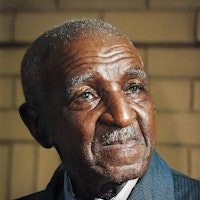More and more as we come closer and closer in touch with nature and its teachings are we able to see the Divine…
George Washington Carver

Nature and Its Teachings
Topic: The Natural World
More and more as we come closer and closer in touch with nature and its teachings are we able to see the Divine and are therefore fitted to interpret correctly the various languages spoken by all forms of nature about us.
George Washington Carver, born into slavery around July 12, 1864, in Diamond, Missouri, rose to prominence as a scientist who made significant contributions to agriculture and botany. Despite the challenges of slavery and racial discrimination, he pursued education with determination, eventually earning a Bachelor of Science and a master's degree from Iowa State Agricultural College. Carver’s early life was marked by a resilient pursuit of knowledge, which set the stage for his later achievements.
At Tuskegee Institute in Alabama, Carver embarked on groundbreaking agricultural research. He was instrumental in introducing alternative crops like peanuts and sweet potatoes to impoverished Southern farmers, including those who had historically enslaved African Americans. His work in developing over 300 peanut products and numerous sweet potato products was crucial in diversifying farming practices and rejuvenating depleted soils. Carver was not just a scientist but also an educator, conducting workshops to teach sustainable farming techniques.
Carver's impact extended beyond the United States. He corresponded with international figures like Mahatma Gandhi, sharing insights on nutrition and sustainable agriculture. Although there is no record of Carver traveling to India to advise Gandhi, their exchange reflects the global reach and relevance of his work. Carver's legacy is not only in his scientific achievements but also in his commitment to the common good, transcending racial and national boundaries to improve lives through sustainable agricultural practices. He passed away on January 5, 1943, leaving a lasting mark on both American agriculture and global environmental practices.
Carver, George Washington [George Washington Carver, How to Search for Truth, letter to Hubert W. Pelt (1930-02-24)].

George Washington Carver
Theme: Natural World

About This George Washington Carver Quotation [Commentary]
George Washington Carver wrote, “More and more as we come closer and closer in touch with nature and its teachings are we able to see the Divine.” His use of repetition—“more and more” and “closer and closer”—points to a steady unfolding, where attention to nature becomes a way of perceiving the sacred. For Carver, this is not an abstract idea. It is through actual contact with “nature and its teachings” that one becomes able to see clearly. The Divine is not separate from the world around us but revealed through the life of the earth itself.
He continues, “and are therefore fitted to interpret correctly the various languages spoken by all forms of nature about us.” As we come into closer touch, we are not just seeing more—we are becoming able to interpret. Carver saw nature as speaking in “various languages,” and believed that understanding comes through this process of attentiveness and humility. We become “fitted”—prepared—to receive what the world around us is saying. The phrase “interpret correctly” reflects his conviction that not all seeing is clear; understanding requires inner readiness and sustained relationship with nature.
In linking perception with interpretation, Carver united scientific observation with spiritual clarity. Nature teaches, and those teachings bring us closer to the Divine. By emphasizing that “all forms of nature” speak, he affirmed that every part of the natural world holds meaning. His invitation is not only to look, but to listen carefully and long enough that the Divine presence becomes visible and understandable within what is already around us.
George Washington Carver
George Washington Carver (12 July 1864 – 5 January 1943) was an African-American teacher, scientist, botanist and agricultural researcher who worked in his native Southern United States. He taught at the Tuskegee Institute in Alabama.
Dr. Carver only patented three of his inventions. In his words, “It is not the style of clothes one wears, neither the kind of automobile one drives, nor the amount of money one has in the bank that counts. These mean nothing. It is simply service that measures success.” Dr. Carver corresponded with Mahatma Gandhi about nutrition and sustainable farming practices in developing nations such as India.
Franklin D. Roosevelt on the versatility of Dr. Carter’s genius
George Washington Carver and the Tuskegee Institute
George Washington Carver responded to Booker T. Washington’s invitation to teach at the Tuskegee Institute. He is buried at Tuskegee next to Booker T. Washington. His epitaph reads: “He could have added fortune to fame, but caring for neither, he found happiness and honor in being helpful to the world.”
Additional George Washington Carver Quotes
Resources
Related Quotes
Copyright © 2017 – 2025 LuminaryQuotes.com About Us